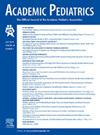教授儿科住院医师传递困难新闻的沟通框架:实践方法的随机对照试验。
IF 2.8
3区 医学
Q1 PEDIATRICS
引用次数: 0
摘要
目标:(1)通过使用具有有效性证据的沟通框架(m-SPIKES框架)对儿科住院医师进行教育,提高住院医师传递困难新闻(DDN)的技能。(2)确定同伴角色扮演的小组练习或快速循环刻意练习(RCDP)模拟是提高DDN的更有效的练习方式。方法:免irb单机构试点随机对照试验,涉及28名儿科住院医师。住院医生参加了一个教育干预,包括一个大小组的教学会议,学习m-SPIKES框架,然后随机分为同伴角色扮演组或RCDP组进行小组实践。住院医师使用李克特量表完成了关于DDN自我效能的前后调查,并在教育干预前后与标准化患者进行模拟时,由训练有素的教师评估基本沟通技巧和m- spike掌握情况。数据分析采用双变量推理统计分析和t检验。结果:教育干预后,两组居民在DDN、基本沟通技能和m-SPIKES使用方面的自我效能显著提高(p=结论:虽然这种教育干预表明同伴角色扮演组和RCDP组的所有居民的DDN技能都有显著提高,但需要更多的研究来确定RCDP的使用是否有利于沟通教育。本文章由计算机程序翻译,如有差异,请以英文原文为准。
Teaching Pediatrics Residents a Communication Framework for Delivering Difficult News: A Randomized Controlled Trial of Practice Methods
Objectives
1) Improve resident skills in delivering difficult news (DDN) by educating pediatric residents using a communication framework with validity evidence, the m-SPIKES (an acronym for modified setting, perception, involvement, knowledge, empathy, and summarize/strategize) framework. 2) Determine whether small-group practice with peer role-play or Rapid cycle deliberate practice (RCDP) simulation is a more effective practice modality for improving DDN.
Methods
Institutional review board-exempt single-institution pilot randomized controlled trial involving 28 pediatric residents. Residents attended an educational intervention that consisted of a large-group didactic session to learn the m-SPIKES framework followed by randomization into either peer role-play or RCDP groups for small-group practice. The residents completed pre- and postsurveys regarding self-efficacy in DDN using a Likert scale and were evaluated for fundamental communication skills and mastery of m-SPIKES by trained faculty during a simulation with a standardized patient before and after the educational intervention. Data were analyzed using bivariate inferential statistical analysis with t tests.
Results
After the educational intervention, residents in both cohorts were found to have significantly increased self-efficacy in DDN, fundamental communication skills, and overall mastery of the use of m-SPIKES (P ≤ .001). The 2 cohorts had similar improvements in self-efficacy (P = .223) and fundamental communication skills (P = .306); however, the peer role-play showed a significant improvement in mastery of m-SPIKES when compared to the RCDP group (P = .046).
Conclusions
While this educational intervention demonstrated a significant improvement in DDN skills for all residents in both the peer role-play and RCDP groups, more studies are needed to determine whether the use of RCDP is advantageous in communication education.
求助全文
通过发布文献求助,成功后即可免费获取论文全文。
去求助
来源期刊

Academic Pediatrics
PEDIATRICS-
CiteScore
4.60
自引率
12.90%
发文量
300
审稿时长
60 days
期刊介绍:
Academic Pediatrics, the official journal of the Academic Pediatric Association, is a peer-reviewed publication whose purpose is to strengthen the research and educational base of academic general pediatrics. The journal provides leadership in pediatric education, research, patient care and advocacy. Content areas include pediatric education, emergency medicine, injury, abuse, behavioral pediatrics, holistic medicine, child health services and health policy,and the environment. The journal provides an active forum for the presentation of pediatric educational research in diverse settings, involving medical students, residents, fellows, and practicing professionals. The journal also emphasizes important research relating to the quality of child health care, health care policy, and the organization of child health services. It also includes systematic reviews of primary care interventions and important methodologic papers to aid research in child health and education.
 求助内容:
求助内容: 应助结果提醒方式:
应助结果提醒方式:


